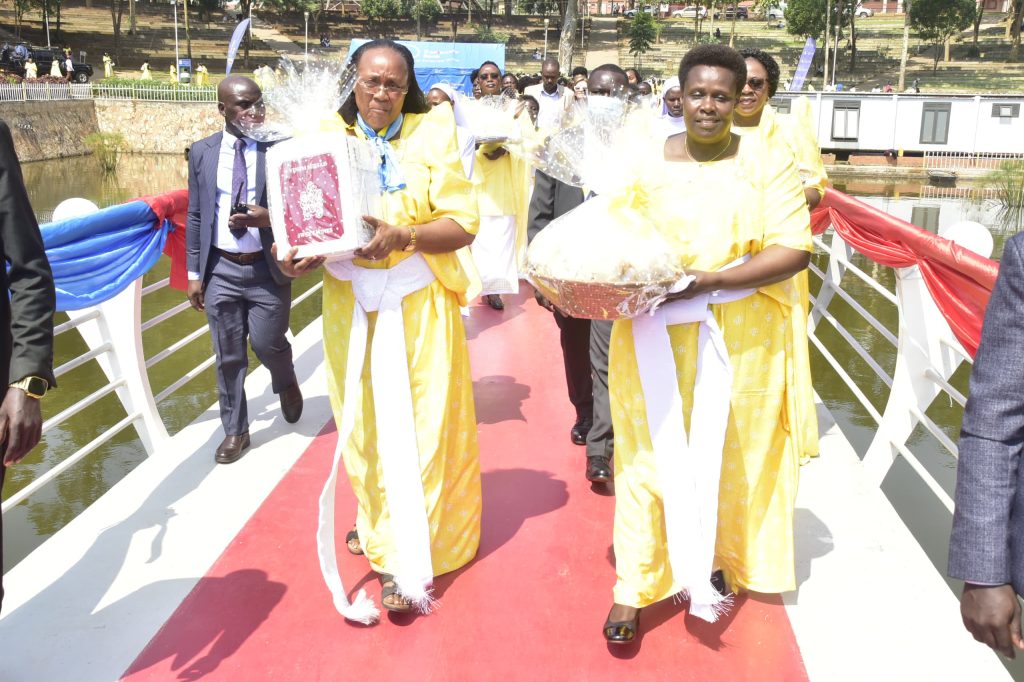KAMPALA: President Yoweri Museveni has called on Catholic women across Africa to work towards the elimination of subsistence farming, saying it is a key driver of poverty and backwardness.

“When families rise out of poverty through commercial farming, manufacturing, services, and ICT, it becomes easier to address the remaining challenges faced by women,” he said.
The President emphasized that women are integral to both the family and society, adding that families with wealth can more easily support the education of their daughters.
“A daughter or son of a wealthy family cannot drop out of school due to a lack of school fees. Therefore, lifting families out of poverty is a solid foundation for solving other problems,” he stressed.
His remarks were delivered in a statement read by Vice President Maj. (Rtd) Jessica Alupo during the Africa Region Conference of the World Union of Catholic Women’s Organisations, held today, July 29, 2025, at the Uganda Martyrs’ Shrine in Namugongo.
President Museveni commended Ugandan women for embracing the NRM’s message of household-level wealth creation.
He noted that poverty in Uganda is largely due to the fact that 33% of households are still engaged in subsistence farming.
“They are working only for food. This is dangerous because, in addition to food, there are other human needs such as shelter and clothing, which require money. It is no longer sustainable to live outside the money economy and expect to enjoy a decent life,” he emphasized.
The President told the women that before 1986, the full potential of women in Uganda had not been realized, as they were denied opportunities in all spheres of life.
“Women were on the periphery of development in Uganda. Their labor was often not recognized in national economic statistics. They had no independent access to property like land or livestock, which was typically inherited by men. Without access to collateral, they were excluded from credit schemes. Women had no say in family or national decision-making, and were rarely consulted in development or health programs. Expressing strong opinions was seen as unwomanly. Moreover, they were victims of harmful cultural practices like female genital mutilation. With such economic and cultural deprivation, it was difficult for Ugandan women to fulfill their potential.”
He added that the NRM government ended many of these discriminatory practices by opening up opportunities for all.
He underscored that it was the NRM which introduced positive discrimination through affirmative action, allowing women to catch up with men and fully participate in political and socio-economic affairs.
“Today, women are represented at all levels of governance and decision-making. I thank the women and girls who have taken advantage of affirmative action to elevate their status in society,” he said.
Museveni assured the women from across Africa that the NRM believes in the potential of all people to contribute to the socio-economic transformation of society.
He cited free education programs like UPE and USE as having significantly transformed the status of women.
“A mother’s level of education determines whether she will get a tetanus vaccination during pregnancy, whether a trained health worker will assist in childbirth, whether she knows the benefits of breastfeeding, or how to prevent childhood illnesses. Therefore, educating and skilling the girl child is one of the most effective ways to empower not just women, but entire communities.”
The President congratulated Catholic women on reaching the Jubilee year of their organization and praised them for their contributions and sacrifices.
“This is a profound milestone, and I trust that this meeting will provide an opportunity to reflect on your achievements and future goals,” he said.
He urged the conference to continue highlighting the role of women in societal development and how their contributions can transform families, communities, and nations.
The conference began with Mass led by Archbishop Paul Ssemogerere, Chair of the Lay Apostolate Commission of the Uganda Episcopal Conference and Archbishop of Kampala. He congratulated Uganda, “the Pearl of Africa and land of the Uganda Martyrs,” for hosting the event. Delegates came from over 25 countries.
The Archbishop noted that women are often the first to suffer from environmental degradation, yet they hold the wisdom to live in harmony with nature.
“This conference rightly highlights their role as stewards of creation. I urge you to continue promoting sustainable practices and environmental education to safeguard our planet for future generations,” he said.
Monica Santamarina, President General of the World Union of Catholic Women’s Organisations, encouraged women to reflect on the conference theme, “Women, Custodians of Mother Earth,” by nurturing both families and the planet.
Assumpta Gidudu, President of the Uganda Catholic Women Apostolate, highlighted how women in Uganda have benefited from professional guidance, skills training, and health education, which continue to empower them.
She emphasized that collaboration with government bodies, other organizations, and faith-based groups has been crucial in improving the lives of women.
Gidudu urged women to renew their commitment to peace, unity, and service